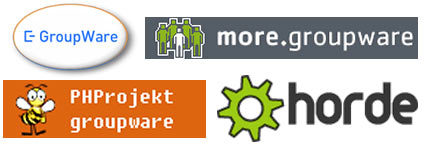4 OpenSource Groupware Tools
Get Tom's Hardware's best news and in-depth reviews, straight to your inbox.
You are now subscribed
Your newsletter sign-up was successful
We Can Do This - Together!
Since normal work processes tend to produce more and more data, small and mid-sized businesses have increasing problems providing their employees with the appropriate information. This situation gets even more difficult with employees working off-site: the closer your team has to work together, the better optimized their communication needs to be in order to achieve the best possible results.
Simply put, distributing documents as email attachments and sending them to numerous recipients is not the way to go. First of all, everybody receiving emails needs to organize them, and even more important, there is the matter of the integrity of your contents. With email, it is not only possible to lose track of what exactly is going on, but also to lose control over data. Three different versions of a document with no indication of which is the most current one could cause some serious damage to your entire work process.
If you have ever tried to get five people to agree on a date for a meeting you know what I am talking about.
The Groupware Advantage
Using a groupware server allows employees to access the same data. By providing contacts, notes, appointments and task lists, these help to minimize the effort of synchronizing the data for all team members. If any data is edited, such as an address, all team members have direct access to the new information.
Placing your data on a centralized groupware server also has a lot of other advantages. Your data needs to be backed up only on your server; software updates are available for all employees more quickly, and they have to be initialized only once. Essential application interfaces are coherent, so users don't have to get used to various programs and work processes.
There Are Alternatives To Exchange Server
To meet the requirements mentioned above, more and more businesses turn to groupware solutions. The best known program of its kind is Microsoft's Exchange Server, which comes with a lot of advantages, the most valuable being that it is a de facto standard. Keep in mind, however, that it is somewhat expensive, and might be oversized for you business needs. There are many alternatives in the OpenSource groupware section, so let's take a look at four of them.
To use groupware solutions like eGroupWare, Horde, moreGroupware and phpProject, you need a webserver to act as a basis for standard installations, and to support PHP as well as a database server. Since all groupware solutions support PHP, you shouldn't encounter any difficulties with current operating systems. You can run webservers and database servers on your computer simultaneously. We used Linux, Apache with php as webserver, and MySQL as database server. You can operate your groupware simply via Internet browsers. Since the installation itself doesn't really differ in any of the four solutions, we used eGroupWare as example.
Get Tom's Hardware's best news and in-depth reviews, straight to your inbox.
-
Faruq Hasan good write-up. Have you tried Simple Groupware ? Rather, please try sgsML and create a module of your own, and then advise what you think of it. 6mb groupware with all of what you say is missing above.Reply
Cheers.

